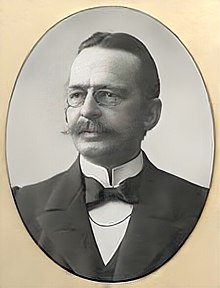Hjalmar Falk
Hjalmar Sejersted Falk (born April 2, 1859 in Vang , Hedmark ; † November 2, 1928 in Oslo ) was a Norwegian linguist and philologist specializing in German and Nordic studies. In addition to his more than thirty years at the Kristiania University (today: Oslo), he also worked as a language teacher.
Studies, teaching and academic work

After taking the Artium 1876 exam , Falk first studied engineering at the Royal Saxon Polytechnic in Dresden and mathematics at the University of Oslo. However, he soon switched to the humanities and finished his studies in 1882 with the linguistic-historical teacher examination. In addition to his work as a teacher, he carried out research, mainly on German and Nordic mythology . As part of this, he spent stays abroad in Germany ( Tübingen ) and England .
In 1888 Falk received his doctorate with the dissertation The nomina agentis of the Old Norse language . In 1890 he received a scholarship at the University of Oslo and also works as a teacher at various schools in Oslo. In 1897 he was appointed professor of Germanic philology, combined with the obligation to teach German and Nordic.
Hjalmar Falk advocated practical and modern methods of language teaching. The committee for the preparation of the Norwegian spelling reform of 1917 was under his leadership.
Scientific position and works
Falk is regarded as a student of the young grammarians of the Leipzig School, who takes the view that linguistics is also subject to natural laws and that the change in language should therefore be understood as a positivist fact . The Old Norse Armory , published in German in 1914 , is dedicated to one of the main representatives of this school, Eduard Sievers . This work, together with Old Norse Seewesen (1913) and Old West Norse Clothing (1919), is symptomatic of Falk's sociolinguistic working method avant la lettre .
In addition to his philological interest, Falk also worked on Nordic mythology. He was in close contact with Sophus Bugge and Moltke Moe . He wrote several works in this area, including A. on the Frithjofssage and the old Norse sun song of the Edda .
Together with his close friend Alf Torp , from 1903 to 1906 he published the first (and up to 2000 only) etymological dictionary of the Norwegian (and Danish) language in two volumes, the Etymologisk ordbog over det norske og danske sprog . It was translated into German in 1910 and the Norwegian version was reissued as a facsimile in 1991 because of its popularity.
Awards and offices
- 1885: Awarding of the HKH Gold Medal of the Crown Prince for outstanding academic achievements (prize writing for word formation in Norwegian)
- 1895: Chairman of the Norwegian Student Union
- 1906–1909: Dean of the Faculty of Arts
- 1911: Appointed knight 1st class of the Order of Saint Olav
Web links
- Digitized copies of Falk's works in the Norwegian National Library (Norwegian)
- Hjalmar Falk in the store norske leksikon (Norwegian)
Individual evidence
- ↑ urn : nbn: no-nb_digibok_2006090400050
- ↑ urn : nbn: no-nb_digibok_2012062006129
- ↑ urn : nbn: no-nb_digibok_2011011906052
- ↑ urn : nbn: no-nb_digibok_2011103124035
- ↑ Hjalmar Falk . In: Norsk biografisk leksikon . (Norwegian, snl.no [accessed November 23, 2016]).
| personal data | |
|---|---|
| SURNAME | Falk, Hjalmar |
| ALTERNATIVE NAMES | Falk, Hjalmar Sejersted (full name) |
| BRIEF DESCRIPTION | Norwegian linguist and philologist in German and Nordic studies |
| DATE OF BIRTH | April 2, 1859 |
| PLACE OF BIRTH | Vang , Hedmark |
| DATE OF DEATH | November 2, 1928 |
| Place of death | Oslo |
